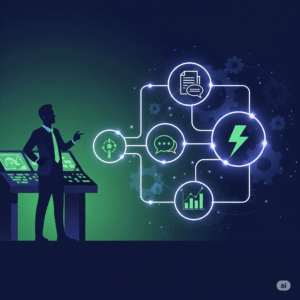As a small business owner, your most valuable resources are time and money. You’re constantly juggling marketing, sales, customer service, and operations, often with a lean team and an even leaner budget. For years, advanced technology that could automate tasks and provide deep business insights felt like a luxury reserved for large corporations with massive IT departments. But the landscape has dramatically changed. The rise of accessible and affordable artificial intelligence is here, and it’s the single biggest opportunity for growth you have today.
This guide is designed to cut through the hype and show you exactly how AI for small business is not just a futuristic concept, but a practical, game-changing reality. We’ll explore how you can leverage intelligent tools to automate tedious tasks, make smarter, data-backed decisions, and deliver exceptional customer experiences that rival the big players. Forget the complexity; think of AI as your new, incredibly efficient team member who works 24/7 to help you grow.
What is AI for Small Business, Really?
Let’s demystify the term. When we talk about AI for small business, we aren’t referring to building sentient robots. We’re talking about smart software designed to perform tasks that typically require human intelligence. This includes learning from data, recognizing patterns, making predictions, and even generating creative content. Think of the spam filter in your email, the product recommendations you see on Amazon, or the chatbot that instantly answers your question on a website. That’s AI in action.
For you, the small business owner, this translates into powerful, easy-to-use tools that can write your social media posts, manage your calendar, analyze your sales trends, and provide instant support to your customers. It’s about implementing small business automation AI to handle the repetitive work, freeing you up to focus on the strategic, human-centric parts of your business—like building relationships, innovating products, and planning for the future.
The Game-Changing Benefits of AI for Small Business
Integrating AI into your operations isn’t just about keeping up with trends; it’s about unlocking tangible benefits that directly impact your efficiency and profitability. This is where AI for small business truly shines, turning your operational data into a strategic advantage.
Here are the key benefits you can expect:
- Drastic Time Savings: AI can automate countless administrative and repetitive tasks. From scheduling appointments and sending follow-up emails to organizing invoices, AI tools can give you back hours every single week. According to a Zapier report, businesses are already using automation to save significant time, and AI supercharges this capability.
- Enhanced Marketing and Sales: AI algorithms can analyze customer data to identify your most profitable segments, predict which leads are most likely to convert, and personalize marketing messages at scale. This leads to higher conversion rates and a much better return on your marketing spend.
- Superior Customer Service: AI-powered chatbots can provide 24/7 support, answering common customer questions instantly. This improves customer satisfaction and frees up your team to handle more complex inquiries, leading to stronger customer loyalty.
- Data-Driven Decision Making: Instead of relying on gut feelings, you can use AI to analyze your sales figures, website traffic, and customer feedback. These tools present insights in easy-to-understand dashboards, helping you make informed decisions about inventory, pricing, and business strategy.
- Reduced Operational Costs: By automating tasks and optimizing processes, AI reduces the need for manual labor and minimizes human error. From inventory management to bookkeeping, small business automation AI makes your operations leaner and more cost-effective.
Practical AI Applications: How to Use AI for Small Business Today
The power of AI for small business lies in its practical application across every facet of your company. You don’t need a massive overhaul to get started. You can begin by implementing AI in one key area and expand as you see the benefits.
H3: Supercharge Your Marketing with AI
Marketing is often a huge time sink for small businesses. AI can act as your personal marketing assistant.
- Content Creation: Tools like Jasper or the AI assistant in HubSpot can generate blog post ideas, write social media captions, draft email newsletters, and even create ad copy in seconds.
- Social Media Management: AI can analyze the best times to post for maximum engagement, suggest relevant hashtags, and even schedule your content calendar automatically.
- SEO: AI tools can help you identify valuable keywords, analyze competitor strategies, and optimize your website content to rank higher on Google.
H3: Revolutionize Customer Service with Small Business Automation AI
Providing excellent customer service is crucial for retention. Small business automation AI makes it possible to deliver fast, consistent support without a large team.
- 24/7 Chatbots: Implement a simple chatbot on your website to answer frequently asked questions about shipping, returns, or business hours. This instantly resolves a huge portion of customer queries.
- Smart Inboxes: AI tools can automatically sort and prioritize customer emails, routing urgent requests to you and using templates to answer common questions.
- Sentiment Analysis: More advanced AI can analyze customer reviews and emails to gauge sentiment (positive, negative, neutral), helping you quickly identify and address any issues.
H3: Streamline Operations and Finance
AI can bring incredible efficiency to the back-end of your business, an area ripe for automation.
- Bookkeeping and Invoicing: AI-powered accounting software can automatically categorize expenses, send invoice reminders, and help you prepare for tax season with greater accuracy.
- Inventory Management: For retail or e-commerce businesses, AI can forecast demand based on historical sales data and seasonality, suggesting when to reorder products to avoid stockouts or overstocking.
- Scheduling and Appointments: AI scheduling assistants can manage your calendar, find meeting times that work for everyone, and send reminders, eliminating the endless back-and-forth of planning.
Real-World Success Stories: AI for Small Business in Action
These concepts come to life when you see how real businesses are using them. Here are two scenarios showcasing the power of AI for small business.
Case Study 1: “The Daily Grind” Coffee Roastery
A local coffee roastery and café was struggling to manage its social media presence and predict demand for its specialty beans. The owner was spending hours each week trying to create content and often guessed wrong on inventory.
- Problem: Inconsistent marketing and inefficient inventory management were hurting profits.
- AI Solution: They adopted an affordable AI-powered social media tool to generate post ideas and schedule content during peak engagement times. They also started using their point-of-sale system’s AI analytics feature, which analyzed sales data to forecast which beans would be most popular each week.
- Outcome: Social media engagement increased by 40%, driving more foot traffic. The AI-driven inventory forecasts reduced waste by over 25%, directly boosting their profit margin.
Case Study 2: “Innovate Consulting” a Boutique Agency
A small B2B consulting firm needed to find new clients but lacked a dedicated sales team. The founder was spending most of her time on manual outreach with a low success rate.
- Problem: Lead generation was time-consuming and ineffective.
- AI Solution: She implemented a CRM with an AI assistant. The AI helped identify ideal client profiles from professional networks like LinkedIn, drafted personalized outreach emails, and used an AI scheduler to book introductory calls directly into her calendar.
- Outcome: The founder saved over 10 hours per week on manual prospecting. The quality of leads improved dramatically, and the firm’s client acquisition rate doubled within three months.
A Simple Starter’s Guide to Implementing AI in Your Business
Adopting AI for small business doesn’t have to be intimidating. Follow these simple steps to get started on the right foot.
- Identify Your Biggest Pain Point: Don’t try to solve everything at once. What is the single most time-consuming or frustrating part of your business? Is it marketing? Answering emails? Managing your finances? Start there.
- Research Accessible AI Tools: Look for tools designed specifically for small businesses. Start with free trials to see what works for you. Tools like ChatGPT for content ideas, Canva for AI-powered design, and Zapier for connecting apps are excellent starting points.
- Start Small and Test: Choose one tool to solve your identified problem. Dedicate a week to learning and implementing it. For example, use an AI content writer to draft next week’s social media posts.
- Measure the Impact: Did the tool save you time? Did it improve a key metric (like engagement or response time)? Quantifying the benefit will motivate you to explore further.
- Integrate and Expand: Once you’ve found a tool that provides real value, make it a permanent part of your workflow. Then, go back to step one and identify your next biggest pain point to tackle.
The era of AI is not a distant future—it’s here, and it’s more accessible than ever. For small business owners, this is a golden opportunity to automate, innovate, and compete on a level playing field. By embracing these intelligent tools, you can reclaim your time, delight your customers, and build a smarter, more resilient business.



